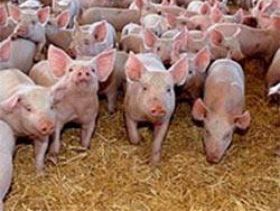 pig meat products from the European Union because of the discovery of African swine fever in Poland and Lithuania has had a severe effect of prices in Poland.
pig meat products from the European Union because of the discovery of African swine fever in Poland and Lithuania has had a severe effect of prices in Poland.Although the agricultural market agency AgroPersepktiva is forecasting that prices will rise, they are still not expected to reach the levels they were a year ago.
However, the Polish pig prices also depend on the exchange rate between the zloty and the Euro, which has always shown some volatility ranging from 4.24 zloty to the Euro at the beginning of the year to 4.13 in March, with several rises a falls in between. At present the rate stands at about 4.19.
Overall the European Commission sees the supply of pig meat on the European market as rising compared to last year, because of the Russian ban and this is expected to force prices down generally.
Poland is expected to feel this general fall in prices acutely.
When Russia first introduced the ban on pig meat from the EU in February prices went down to 4.6 zloty per kilo – nine per cent less than in January and 11 per cent less than in February 2013.
Prices have now risen to an average of 5 zloty per kilo and this level is expected to be maintained.
Experts are forecasting that live pigs in the country will be making between 5 zloty and 5.3 zloty per kilo in June and between 5.3 and 5.7 zloty per kilo by September – still less than in 2013.
The Russian ban could also have an effect on the size of the Polish pig herd which in November last year was 11 million – one per cent lower than the previous year – but the forecast is for the number of pigs bred for slaughter is expected to fall further as the prices are low and there is no market with the Russian borders closed. This will put less pork on the market.
In 2013, pork production declined by more than four per cent compared to the 2012.
In February this year Polish pork exports fell by 14 per cent compared to a year ago, because of the ban on imports of into the Customs Union - Belarus, Russia and Kazakhstan.
Exports to Ukraine fell by 89 per cent, Japan 41 per cent, South Korea 31 per cent and China 19 per cent.
At the same time, the supply of pork in most EU countries rose, including Slovakia 38 per cent, Germany 29 per cent and Italy 27 per cent.
Between January-February 2014 Polish exports of livestock, meat, fat, and pork products was 98,000 tonnes, which is one per cent less than a year ago. The concerns are reported to be contained in a letter from Sergei Dankvert, head of Rosselkhoznador to Marek Sawicki, Minister of Agriculture in Poland. Now, Russia may ban imports of vegetables, fruits and berries from Poland.
However, the situation could become worse for Poland as Rosselkhoznador, the Russian food safety and veterinary authority, is believed to be considering a ban of more products from Poland because of sanitary and phytosanitary concerns.
While the action taken by Russia to ban pig meat from the EU has hit Poland particularly hard, concern is high in the meat sector right across the EU.
Recently, the French meat industry organisation SNIV called on the European Commission to allow individual countries to negotiate their own export and health agreements with Russia and the other countries in the Customs Union, rather than standing out for an EU-wide agreement.
And the Belgian meat agency VLAM recently described the Russian action as “Hannibal ad portas!”(Hannibal at the gate).
“The Russian Federation, where this plague virus has been out of control and widely spread for several years, was ironically the first country to take draconian measures,” VLAM said.
“The attitude and motivation of the Russian Government is incomprehensible.
The embargo annually affects about 700,000 tonnes of pork, offal and by-products from the European Union - two-thirds of Russia’s import need for pork and pork products.
VLAM says that the European ban will lead to a drop of 14 per cent in the Russian pork consumption.
In the short term, there are no alternatives in terms of supply because of the current restrictions on Canadian, Brazilian and US pork.
In Russia the ban is expected to force pig and pork prices to rise further and Russia is already a country where pork is more expensive than beef and where consumers pay the highest retail price for pork.
VLAM questions what Germany that has 40 per cent of European sales in Russia, do with its 240,000 tonnes of pig meat, mostly bacon and fat and Denmark with its 180,000 tonnes.
“If this embargo continues, one can expect to see a lot more European pork popping up at a cheaper price in the non-Russian countries.
“The Russian embargo completely reshuffles the cards for the European pig industry. If a quick solution is not forthcoming, this will have serious implications on the global pork markets,” VLAM said.





